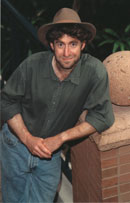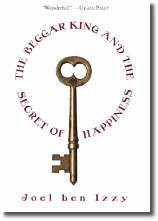|
|
|
|
(continued from previous page)
"That's quite alright. Time means nothing to me--unlike kings, demons live forever. I am content to wait." He slumped down in his chains and began humming to himself.
Desperately curious to hear what Ashmodai had to say, Solomon thought for a time, and finally consulted his advisers. All agreed that it was a bad idea to remove his ring. One even went so far as to say it would be unwise.
"Unwise!" shouted Solomon. "You dare to tell me what is wise? I am the great King Solomon, known throughout the world for my wisdom!"
"That's right, your highness," added Ashmodai. "Why should someone as wise as yourself listen to them?"
Solomon's advisers remained silent, as afraid of the king as they were of Ashmodai. Their comments would have been useless, for Solomon had made up his mind. "I shall remove my ring," he said,
"just long enough to hear your answer."
Solomon had Ashmodai placed at one end of the palace, surrounded by twenty-four guards, while he himself stood in the opposite corner.
"Yes, Solomon," said Ashmodai. "Remove your ring!"
Slowly Solomon slid the ring from his finger. For a moment, nothing happened. Then, a gentle breeze began to blow through the palace. Soon it grew stronger, turning to fierce gusts of wind. As Solomon watched, he realized in horror that the wind was coming from the wings of Ashmodai. Each time he flapped them, he doubled in size, from eight feet to sixteen feet to thirty-feet, until he towered to the ceiling of the palace, breaking free of his chains, his laughter shattering the glass in the windows.
"You fool, Solomon! You should never have removed your ring!" He reached down and plucked the ring from Solomon's hand, then threw it out of a tiny window of the palace. The ring sailed over the city of Jerusalem, beyond the distant hills, past mountains and oceans, finally landing at the far end of the world.
"And now, Solomon, it's your turn! Say good-bye to your kingdom!" With these words, he picked the king up by the shoulders and hurled him through a window on the other side of the palace. Solomon sailed over his beloved city, beyond the hills, over the sea for many hours until, at last, he landed in the midst of a vast desert.
There he lay for some time, every part of his body aching, his mouth parched. He pulled himself up and began walking aimlessly, first this way, then that, until, as the sun set, he came upon a pool of water. He knelt down to drink and there saw something that sent a jolt of terror through him--his reflection.
His crown, which had been a gift from the creatures of the sea, covered with every known precious gem, was gone. His beautiful robe, which he'd been given by the wind, was now in shreds, and looked to be nothing more than rags. And his face, which had been the most handsome in all Jerusalem, was now that of a weathered old man.
Thus it was, lost and unknown, that Solomon began his wanderings. Never could he have imagined the twists and turns his road would take as he struggled, in vain, to return to his beloved Jerusalem. It was a journey that would take him great distances and last a lifetime...
I am no King Solomon, nor do I claim his wisdom. My voyage was not that of a king, but of a husband, a father, and a teller of tales. Even so, like Solomon, in the story I had told so often, I found myself in a place I never expected to be, in a life I no longer understood.
My journey carried me into the world of stories. There I learned of the tricks they play upon us, bubbling up through the depths of time to teach us their lessons, guide us, and, if we let them, heal us. I also learned how they can fool us, especially when we think we know them well, how they can cleverly hide their truths in places too obvious to see. Some of these truths I stumbled over, coming across the same lessons Solomon must have found in his travels, lessons that can only be learned from loss.
I'll share these truths I found as I tell you my tale, which is itself a true story. But first, let me say what I mean by "truth." I use the word as storytellers do, the way my old teacher, Lenny, once spoke of truth. He had just told me a most amazing story--about a golden retriever he'd once owned and a blue '67 Mustang convertible--and I asked him if it was true.
"True?" he snapped. "What do you mean by `true'? You want to know if it happened, word for word, exactly as I told it? Makes no difference. You may as well ask me if it's a good story, because a good story is true, whether it happened or not. And a bad story-- even if it happened--is a lie.
"The question," he added with a grin, "is not whether the story 'is true,' but whether it has 'truth' inside it, the kind with a capital T. And that is a mystery only time can solve. But I'll warn you, Joel--never be such a horse's a ss to think that just because you can tell a story, you've found all its truth. There are stories in this world that need to rattle around inside your brain for twenty years before they reveal a final, hidden grain of truth."
Lenny had collected many such grains over the years and they stuck to him, like grit to sandpaper, which may account for his personality. Yet his warning comes to mind whenever I use the word "truth."
That said, I'll tell you my tale essentially as it happened, though I will change some parts along the way, for that is what we storytellers do. Yet, as you read this book, you may find some things that strike you as flat-out unbelievable. I know, for that is just how they struck me when they happened. These are things I could not have made up, and so I'll leave them unchanged. As Mark Twain said: "Truth is stranger than fiction...Fiction is obliged to stick to possibilities; Truth isn't."
With that, sit back and let me tell you my tale, of a journey that took me through dark times, yet gave me a gift that I treasure. That gift is this story, which I now pass on to you--a tale of lost horses and found wisdom, of buried treasures and wild strawberries, of the beggar king and the secret of happiness.
STORY ORIGIN: CHINA
The Lost Horse
Long ago in a village in northern China, there lived a man who owned a magnificent horse. So beautiful was this horse that people came from miles around just to admire it. They told him he was blessed to own such a horse.
"Perhaps," he said. "But what seems like a blessing may be a curse."
One day, the horse ran off. It was gone. People came to say how sorry they were for his bad luck.
"Perhaps," he said. "But what seems like a curse may be a blessing."
A few weeks later, the horse returned. It was not alone. It was followed by twenty-one wild horses. By the law of the land, they became his property. He was rich with horses.
His neighbors came to congratulate him on his good fortune. "Truly," they said, "you have been blessed."
"Perhaps. But what seems like a blessing may be a curse."
Shortly after that his son--his only son--tried to ride one of the wild horses. He was thrown from it and broke his leg. The man's neighbors came to say how sorry they were. Surely, he had been cursed.
"Perhaps," he said. "But what seems like a curse may be a blessing."
A week later, a king came through the village, drafting every able-
bodied young man for a war against the people of the north. It was a horrible war. Everyone who went from that village was killed. Only that man's son survived, because of his broken leg.
To this day in that village, they say, "What seems like a blessing may be a curse. What seems like a curse may be a blessing."
CHAPTER ONE
The Lost Horse
JUST HOW I CAME to be a storyteller is a story in itself, a tale of curses turned to blessings. I certainly wasn't born into the art, though I've met many who were. In a pub at the southern-most tip of Ireland I heard a genuine "seanachie," who sang the ancient ballads with such resonance that you could hear the ghosts of his ancestors singing the chorus. In the Jewish quarter of Jerusalem I came to know a Hassidic "maggid" who could trace his lineage back to Rabbi Nachman of Bratzlav, the great eighteenth-century mystic teller of tales. And once, on the north shore of Oahu, in Hawaii, I shared the stage with a woman who had been chosen as treasurer of five thousand years' worth of her ancestors' stories.
(continued on next page)
|
|
|
|
The Beggar King and the Secret of Happiness
by Joel ben Izzy
Buy online:
$15.39
Copyright © 2003
by Joel ben Izzy
Published by
Algonquin Books of Chapel Hill
|
ABOUT
THE AUTHOR

JOEL BEN IZZY tells stories at festivals throughout the world and has produced six CDs, which have 4 won awards from the American Library Association and the Parents' Choice Foundation. He serves as a story consultant to trial lawyers, psychologists, and CEOs and teaches storytelling courses for various organizations, including Hewlett-Packard, the W.K. Kellogg Foundation, and Pixar Animation Studios. He lives in Berkeley, California, with his wife and two children.
|
|
|
|

